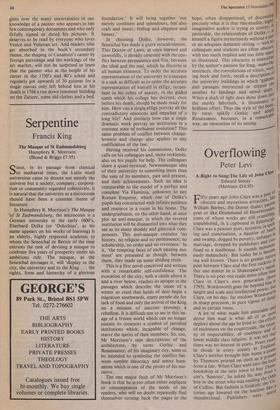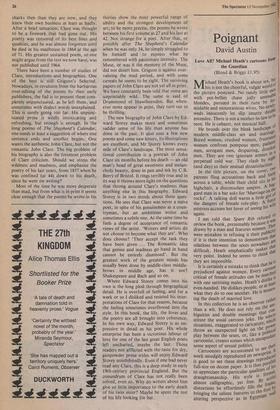Overflowing
Peter Levi
A Right to Song:The Life of John Clore Edward Storey (Methuen £14.95)
Fifty years ago John Clare was a poet of obscure and mysterious attraction, lase William Barnes, the Dorset dialect Pars°: poet or like Drummond of Hawthornde"' some of whose works are still cruMblit unpublished, in a cupboard in Edinbargil: Clare was a peasant poet, eccentric in sPet, ing and punctuation, a haunter of heath ing swamp, dogged by poverty, unhaPPY in marriage, dropped by publishers and ecin- fined to a madhouse. It sounds monoteir ously melancholy. But today ing well known. There is no greater natur.n poet between Clare and the first cuckoo: I,. this one matter he is Shakespeare's al% There is no poet one reads more often torn Clare in Clare's own generation (b°'.., 1793). Wordsworth goes far beyond hint l'; Clare, on his da length and scale and intellectual power, but
and in certain tones.
in sharp precision, in pure vigour of detail he is beconre Y, far outdoes wordswor`!: andA lot of what made him miserable 3 t drove him mad is what all of US ,111, °,455 deplore about the age he lived in: the of enclosures on the ountryside, the tyraoPf ny of respectability, c of snobbery ail(' hat lower middle class religion. It was not tm there was no interest in poets. Poets swacT, in shoals in every county in Englarim Clare's mother brought him home a Poerit by Thomson printed on cloth as a Preseal from a fair. When Clare went into the Will_ bookshop in the next town to buy 1-h° a son's 'Seasons', he asked his way fromdes boy in the street who was reading the 0.1c_ of Collins. But fashion is freakish: the ve a torian age lowered on the horizon liko.D,, thundercloud. Publishers were w
sharks then than they are now, and they knew their own business at least as badly. After a brief sensation, Clare was thought to be a firework that had gone out. His poetry was censored of its best lines and qualities, and he was almost forgotten until he died in his madhouse in 1864 at the age of 71. His greatest sustained poem, so one might argue from the text we now have, was not published until 1964.
There have been a number of studies of Clare, introductions and biographies. One of the best is still Grigson's Selected. Nowadays, in revulsion from the barbarous over-editing of the poems by their early publishers, the fad is to present them com- pletely unpunctuated, as he left them, and sometimes with dialect words unexplained. This is surely going too far. His unpunc- tuated prose is wildly intoxicating and refreshing, but enough is enough. In the long poems of The Shepherd's Calendar, one needs at least a suggestion of where one sentence ends and another begins. One wants the authentic John Clare, but not the romantic John Clare. The big problem of his biography is also the foremost problem of Clare criticism. Should we stress the wildness and madness, and emphasise the poetry of his last years, from 1837 when he was confined (at 44) down to his death, since he went on writing?
Most of the time he was more desperate than mad, but from what is in print it seems clear enough that the poems he wrote in his thirties show the most powerful range of ability and the strongest development of art; to be more precise, the poems he wrote between his first volume at 27 and his last at 42. Not strange for a poet. After that, or
possibly after The Shepherd's Calendar when he was only 34, he simply struggled to be himself and to express what he remembered with passionate intensity. The Muse, or was it the memory of the Muse, did not desert him. Grigson is against over- valuing the mad period, and with some caveats he seems to be right. The surviving papers of John Clare are not yet all in print. We have constantly been told that some are unprintably wild. The same is said of Drummond of Hawthornden. But when- ever more appear in print, they turn out to be thrilling.
The new biography of John Clare by Ed- ward Storey makes more and sometimes sadder sense of his life than anyone has done in the past. It also uses a few new poems and some new letters, its illustrations are excellent, and Mr Storey knows every mile of Clare's landscape. The most sensa- tional contribution is a portrait of John Clare six months before his death — an old man's head of great sweetness and melan- choly beauty, done in pen and ink by C.B. Berry of Bristol. It rings terribly true and in its way it throws more light on the questions that throng around Clare's madness than anything else in this biography. Edward Storey is in two minds about these ques- tions. He sees that Clare was never a naive poet, in spite of his genuineness as a coun- tryman, but an ambitious writer and sometimes a subtle one. At the same time he feels a degree of acceptance of romantic views of the artist. 'Writers and artists do not choose to become what they are'. Who does choose? 'They accept the task they have been given ... The Romantic idea that genius and madness go hand in hand cannot be entirely dismissed'. But the greatest work of the greatest minds has usually been done by middle-class middle- brows in middle age, has it not? Shakespeare and Bach and so on.
Where Edward Storey comes into his own is the long plod through biographical detail. He is overfull of feeling, and for a week or so I disliked and resisted his inter- pretations of Clare for that reason, because the feeling sometimes overflowed into the style. In this book, the life, the loves and the poetry are all brought into coherence. In his own way, Edward Storey is as im- pressive in detail as his poet. His whole enterprise has been a victorious labour of love for one of the last great English poets left uncharted, maybe the last. Those readers not afflicted with the taste for dry, gunpowder prose styles will enjoy Edward Storey uninhibitedly. Even if one had never read any Clare, this is a deep study in early 19th-century provincial England. But the conundrum of Clare has not really been solved, even so. Why do writers about him give so little importance to the early death of his twin sister? Maybe he spent the rest of his life looking for her.















































 Previous page
Previous page